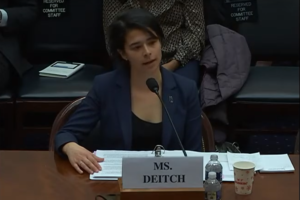Humanists Testify on International Religious Freedom Before Congress

The American Humanist Association (AHA) has long combatted blasphemy laws around the world. These laws ban the expression of doubts or criticism of religion, often favoring the majority faith. In some countries, the penalty for violating these laws can be as severe as death, and harm not just the nonreligious, but dissidents of every faith.
In the last few years, the American Humanist Association has supported members of the Congressional Freethought Caucus as they introduce resolutions that call upon the president and the US Department of State to make the repeal of blasphemy laws a priority in their relationships with countries that have such laws, and to release prisoners who have been accused or convicted of blasphemy offenses. The resolutions further call for the president and State Department to oppose any efforts at the United Nations or other international forums to support blasphemy laws.
This week, for the first time ever, a humanist witness was called to testify before the US House of Representatives Foreign Affairs Subcommittee on Africa, Global Health, Global Human Rights, and International Organizations, along with the Oversight and Reform Subcommittee on Civil Rights and Civil Liberties. AHA Policy Manager Rachel Deitch presented testimony on behalf of a humanist activist who is a victim of dangerous blasphemy laws, Rafida Bonya Ahmed. She spoke about the harm these laws cause and just how impactful an official stance from the president and the Department of State could be.
Ahmed, a Bangladeshi-American blogger, and her husband, Avijit Roy, were attacked by Islamic extremists at a book fair in Bangladesh in 2015, where she was gravely injured and Avijit was killed. “Blasphemy laws produce the opposite effect of protecting religious freedom,” Ahmed explained.
They entangle policymakers, courts, and law enforcement with narrow views of religion that often prop up already powerful religious groups. And the impact on minority religions and on nonreligious groups is far reaching.
The American Humanist Association was honored to have Ahmed’s powerful testimony to illustrate the injustices that many minority faith groups, including outspoken nonreligious individuals, face around the world. The AHA is very hopeful that her testimony, presented by Deitch, will encourage the committee to advance House Resolution 512.
In the past five years, eight countries have abolished blasphemy laws. But sixty-nine countries still have these laws on the books, and some of those nations are actually strengthening both penalties for blasphemy and prosecutorial practices. A 2019 report by Humanists International namedstates such as Saudi Arabia and Pakistan as “perennial” offenders when it comes to blasphemy persecution. Despite the well-publicized release of Christian farmworker Asia Bibi, the report condemns the ongoing imprisonment of several accused atheists and many others in Pakistan, as well as extrajudicial violence against both humanists and religious minorities related to blasphemy accusations.
The report also highlights a deterioration of rights in other countries. Humanists International noted, “both Brunei and Mauritania have increased the penalties for blasphemy and apostasy in the past two years, making the crimes punishable by death. High-profile blasphemy prosecutions are cited as cause for concern in Indonesia, as is the backlash against demonstrators protesting forced wearing of the hijab in Iran.” Countries that don’t enforce the blasphemy laws that remain on the books don’t escape criticism either. States that do enforce draconian punishment can use the existence of these laws in arguably more progressive nations to justify their own.
Working to end these laws is an interfaith and intersectional issue. The AHA brought together a broad coalition of more than sixty national and international faith-based, nontheist, and religious freedom advocacy organizations in supporting House Resolution 512 and its companion resolution in the Senate, Senate Resolution 458.
“Humanists rely on reason- and evidence-based decision-making,” Ahmed concluded. “We believe in the inherent moral worth of each individual person and in each person’s right to free expression, and we believe that human-made problems require human-devised solutions.”
